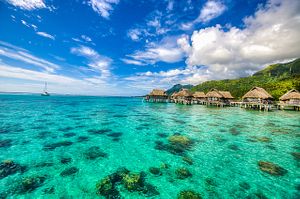Wang Chen, head of Tahiti Nui Ocean Foods, a subsidiary of China’s Tianrui group, met with Tahitian top leaders in mid-August 2017 to announce the construction of a fish farm on Hao Atoll to begin in December 2017 and to be operational by 2020. It is estimated that this farm will produce 50,000 tons of fish, mainly grouper, that will be exported to the Chinese market, thanks to the island’s runway, which was inherited from the French army. Hao Island was used in the past by the French army when nuclear weapons tests were conducted on nearby Mururoa atoll.
The construction of this fish farm has been in the pipeline for three years and has been scaled down due to locals’ concerns about the consequences of fish farming on the atoll’s environment. However, the project is considered a huge opportunity by Polynesian officials. This one-billion-euro investment will create hundreds of jobs in a territory that suffers from a high unemployment rate (20 percent and even higher in more-remote islands). French Polynesia also faces a huge trade deficit; its exports cover slightly more than 6 percent of its imports. Chinese investments in fish farms will enable the diversification of Tahiti’s economy, which is currently dominated by pearl culturing (which represents more than two-thirds of its exports).
Since 2004 and the adoption of the Organic Law, French Polynesia has gained greater autonomy for international representation, the latest example of this being French Polynesia and New Caledonia’s full membership in the Pacific Islands Forum in September 2016. This trend is intensifying as New Caledonia’s 2018 self-determination referendum draws closer. Whatever its outcome, this consultation will have consequences for other French Pacific territories such as French Polynesia and Wallis and Futuna. While France is disengaging from its territories, French Polynesia has been searching to increase its relationships with international partners and particularly with China. French Polynesia regularly sends delegations to China to promote itself as a destination for the Chinese audience, while several Chinese companies including China Railway have visited Tahiti for potential cooperation agreements.
French Polynesia is home to a large Chinese community, with 5 to 10 percent of its total population being of Chinese origin. The first Chinese migrants arrived in Tahiti in the 1860s, mostly as plantation workers, and Chinese immigrants to Tahiti have contributed largely to the territory’s economy. Robert Wan, the son a Chinese immigrant, introduced oyster farms to French Polynesia in the 1970s.
In spite of this legacy, Polynesian-Chinese relations can be further improved. China is one of French Polynesia’s main trade partners; 10 percent of Tahitian imports come from China, and a third of Tahitian exports go to Hong Kong, mostly in the form of pearls. Tourism has been a major economic sector for French Polynesia, comprising more than 12 percent of its GDP. But unlike Palau and Fiji, French Polynesia has failed to become a popular destination for Chinese travelers. With less than 6,000 visitors in 2017, Chinese tourists in French Polynesia rank only eighth. This low figure is due in part to the lack of direct regular flights connecting China to Papeete, the capital of French Polynesia. Chinese visitors must travel on infrequent charter flights or stop in Tokyo or Auckland. China’s HNA group delayed the launch of direct regular flights from China to Tahiti, announced previously in 2015. But the Hainan-based group has invested in the French Polynesia’s territory by purchasing two hotels on the islands of Moorea and Bora-Bora in 2016 and offering luxury dream journeys from Hong Kong to Tahiti through their subsidiary Deer Jet since 2017. China’s State Council’s recent new rules on overseas investments that restrict investments in the real estate and leisure sectors may have an impact on Chinese tourism to Tahiti and could limit future Chinese investments in French Polynesia’s tourist sector.
French Polynesia is currently at a crossroads. Attracting more investments such as Hao’s fish farms and tourists from China would lead to greater economic diversification and provide jobs for Tahitians. However, these projects also require large, high-cost infrastructure improvements (e.g., ports, airport facilities, water and waste management), and these are difficult to carry out due to the numerous and scarcely populated islands that constitute French Polynesia. Moreover, they can also threaten the fragile Tahitian ecosystem. French Polynesia needs to select potential projects with great care since any major damage to its environment would put an end to its idyllic image.
Dr Sebastien Goulard works at Cooperans, a public affairs consultancy specialized in governance and Sino-European relations. Goulard completed a Ph.D. in economic and social development studies from EHESS (Ecole des Hautes Etudes en Sciences Sociales, ‘School for Advanced Studies in the Social Sciences’), Paris

































